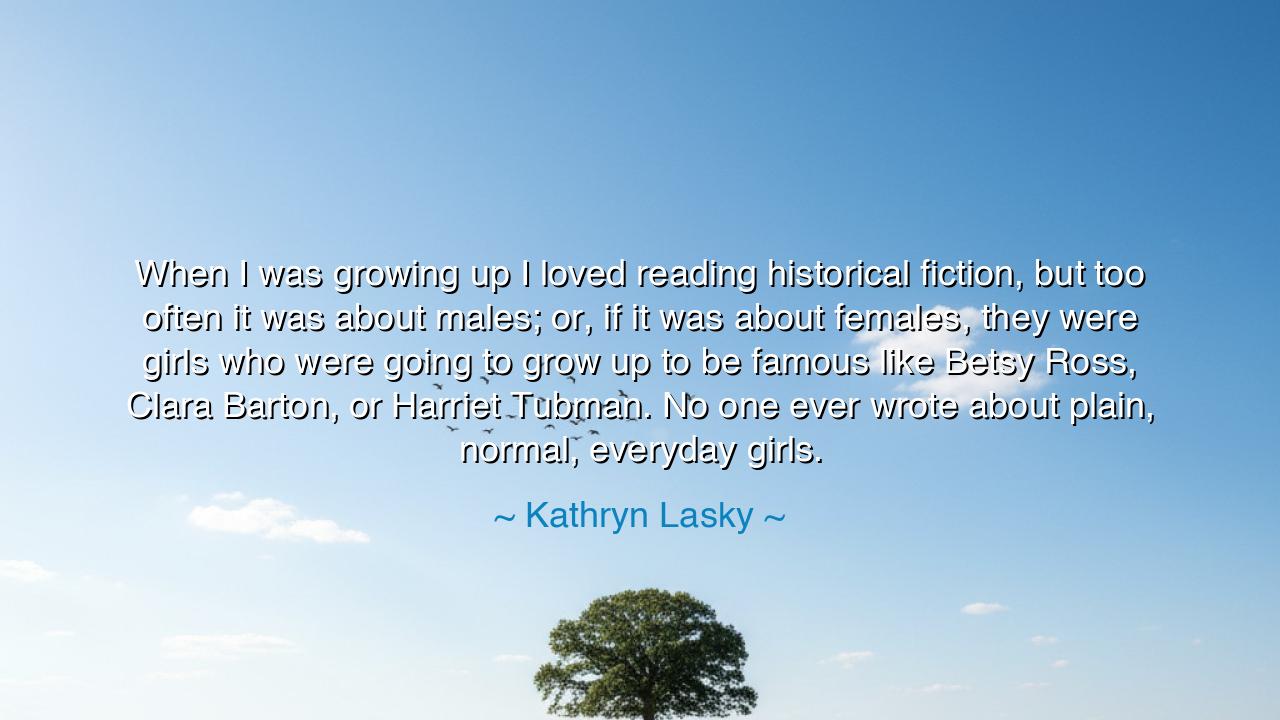
When I was growing up I loved reading historical fiction, but too
When I was growing up I loved reading historical fiction, but too often it was about males; or, if it was about females, they were girls who were going to grow up to be famous like Betsy Ross, Clara Barton, or Harriet Tubman. No one ever wrote about plain, normal, everyday girls.






Host: The room was quiet, the gentle light of the evening giving the space a warm and inviting atmosphere. Jack sat near the window, gazing out into the fading light, his thoughts seemingly drifting. Jeeny, across from him, sat with a book in her lap, her cup of tea resting beside her, though her mind appeared to be lost in reflection. The stillness felt like a moment of quiet anticipation, as if the next conversation would delve into something meaningful.
Host: Kathryn Lasky’s words broke the silence: “When I was growing up I loved reading historical fiction, but too often it was about males; or, if it was about females, they were girls who were going to grow up to be famous like Betsy Ross, Clara Barton, or Harriet Tubman. No one ever wrote about plain, normal, everyday girls.” The honesty and insight in this statement about the lack of representation for everyday girls in literature felt like an invitation to reflect on how stories shape our understanding of ourselves and others. Jack, always thoughtful about the impact of representation, was the first to speak.
Jack: His voice was thoughtful, almost with a sense of regret: “It’s such a valid point. So often, the stories we hear—whether in history or fiction—are about the exceptional, the ones who make it into the history books. But there’s something incredibly powerful about telling the stories of ordinary people, of everyday lives. Girls who don’t end up famous, but who are still making a difference in their own communities and families. The voices of the everyday are often overlooked, but those are the stories that need to be told too.”
Jeeny: She smiled softly, her voice gentle, but filled with insight: “Exactly. There’s a certain kind of power in those everyday stories, in seeing the lives of girls who might not grow up to be famous, but who still have rich, full lives. What Lasky’s saying is that everyone’s story matters—whether you’re a future historical figure or just someone living a quiet, meaningful life. Girls need to see themselves in these stories, not just as potential ‘greats,’ but as people who can live meaningful, impactful lives on their own terms.”
Host: The conversation seemed to deepen, as if Lasky’s words had unlocked something important about the stories we tell and the narratives we create. Jack, who usually focused on more practical aspects of life, seemed to reflect on how our understanding of history and culture is often shaped by who gets to tell the stories—and who gets left out.
Jack: His voice softened, almost reflective, as he continued: “Maybe that’s what’s missing in a lot of the stories we tell. We focus on the extraordinary, the exceptional, but we forget that ordinary lives are just as meaningful. It’s in the small, everyday actions that we find true human connection. And those stories aren’t less valuable—if anything, they’re more relatable, more accessible. Girls, especially, need to know that their stories are just as worth telling, whether or not they become famous.”
Jeeny: Her expression deepened, her voice reassuring, filled with understanding: “Exactly. By focusing only on the famous or the extraordinary, we risk ignoring the stories that are the most relatable and real. Girls need to see themselves as the main characters in their own stories, with their own quiet power. We all want to feel like we matter, that our lives have meaning, and when we read about girls like us—normal, everyday girls—it’s a reminder that we have our own importance, even if we don’t make it into history books.”
Host: The room seemed to grow a little quieter, as if their conversation had opened up a deeper reflection on the need for representation in stories. The idea that the lives of everyday girls—those who aren’t destined for fame but live with passion and purpose—deserve to be told was both empowering and essential. Jack and Jeeny sat together, understanding that all stories matter, and that the ordinary stories are the ones that speak most directly to our everyday lives.
Jack: His voice, now gentler, seemed almost satisfied: “Maybe that’s the real beauty of storytelling. It’s not just about the famous or the heroic, but about showing that every story has value. The ordinary, the everyday—it’s the fabric of our lives, and those stories deserve to be told too.”
Jeeny: She smiled warmly, her tone affirmative: “Exactly. There’s a certain kind of magic in the stories of ordinary lives, of girls who aren’t going to change the world in huge ways but who are still living meaningful lives. We all need to see that reflected in the stories we hear—because in those everyday lives is where we truly find the essence of what it means to be human.”
Host: The evening continued, but the world outside seemed distant. Inside, Jack and Jeeny sat together in the realization that every story has value—whether it’s about a famous historical figure or an ordinary girl living a full life. The true power of storytelling lies in the recognition that every life matters, and that the stories of everyday people, particularly girls, deserve to be celebrated.






AAdministratorAdministrator
Welcome, honored guests. Please leave a comment, we will respond soon